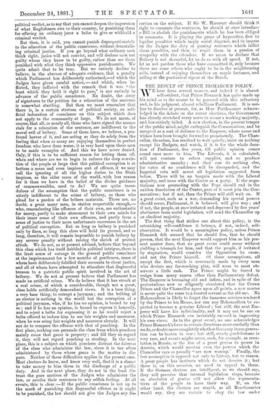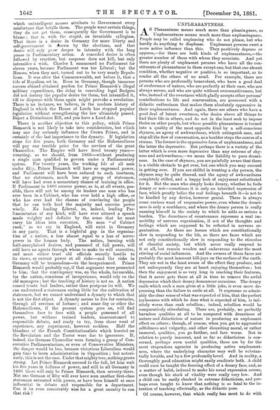THE RESULT OF PRINCE BISMARCK'S POLICY.
NATE hear from several sources, and indeed it is almost self-evident, that Prince Bismarck has quite made up his mind as to the course to be pursued with this refractory and, in his judgment, almost rebellious Parliament. It is use- less to dissolve at present, for, as Herr Puttkammer acknow- ledged in the debate on the recent elections, the Government has already stretched every nerve to secure a working majority, and has entirely failed. A new election, in the present temper of the public mind, might extinguish the Conservatives, and be accepted as a sort of defiance to the Emperor, whose name and wishes have been brought forward so prominently. The Chan- cellor, therefore, has resolved to wait quietly, insist on nothing except his Budgets, and watch, if it is for the whole dura- tion of Parliament, five years, till public opinion comes round once more to him. The Liberals, it is calculated, will not venture to refuse supplies, and so produce administrative anarchy ; and they can do nothing else, for votes of no confidence will be disregarded, and the Imperial veto will arrest all legislation suggested from below. There will be no bargain made with the Liberal majority, and none with the Centre as a party. If the nego- tiations now proceeding with the Pope should end in the sudden dissolution of the Centre, part of it must join the Con- servatives; but if not, then the Prince will still wait on. If a great event, such as a war, demanding his special powers should occur, Parliament, it is believed, will give way ; and if not, the people, at once irritated and depressed by five years' abstinence from social legislation, will send the Chancellor up an obedient majority.
The first thing that strikes one about this policy, is the astonishing self-confidence it betrays, if not, indeed, self- absorption. It would be a meaningless policy, unless Prince Bismarck felt assured that he should live, that he should govern, that the next Emperor would support him as his pre- sent master does, that no great event could occur without yielding a triumph for him, and that the people, if irritated by stagnation, would consider the Opposition its cause, and not the Prince himself. Of those assumptions, all except the first, which is necessarily made by every man who devises any far-reaching plan, will seem to most ob- servers a little rash. The Prince might be forced to resign from many causes other than Parliamentary defeat. The Emperor is becoming old and infirm, and in spite of the protestations now so diligently circulated that the Crown Prince and the Chancellor agree upon all points, a new master is never quite the same to a trusted servant as the old one. No Hohenzollern' is likely to forget the immense services rendered by the Prince to his House, nor can any Hohenzollern be ex- pected to become a genuine Liberal ; but still, the next Em-
peror will have his individuality, and it may not be one on which Prince Bismarck can invariably succeed in impressing his own views. As to the great event, no one acknowledges Prince Bismarck's force in certain directions more cordially than we do, or doubts more completely whether Germany in our genera- tion can be beaten in war ; but still, steady good-fortune is very rare, and events might occur, such, for example, as revo- lution in Russia, or the rise of a great genius to power in Austria, which would overtax even the powers which the Chancellor says so proudly " are now waning." Finally, the last assumption is opposed not only to history, but to reason. A great people has instincts which do not deceive it ; but there is, on this occasion, no need to appeal to them.
If the German electors are intelligent, as we should say, they will perceive that internal legislation stops, because an absolutist of genius will not allow the representa- tives of the people to have their way. If, on the other hand, the electors are stupid, as all Reactionaries would say, they are certain to obey the law under
which unintelligent masses attribute to Government every misfortune that befalls them. The people want certain things, they do not get them, consequently the Government is to blame ; that is, with the stupid, an invariable syllogism. That there is a desire in Germany for more liberty and self-government is 41own by the elections, and that desire will only grow deeper in intensity with the long pause in Parliamentary action. A conceded desire is often followed by reaction, but suspense does not kill, but only intensifies a wish. Charles I. summoned no Parliament for eleven years, because Parliament was too Liberal ; but the Houses, when they met, turned out to be very nearly Repub- lican. It was after the Commonwealth, not before it, that a tide of Royalism set in. Even in Germany, though immense success abroad obtained pardon for Prince Bismarck's illegal military expenditure, the delay in conceding legal Budgets did not destroy the popular desire for them, but intensified it, till to dispense with them again might provoke a revolution. There is no instance, we believe, in the modern history of England in which the House of Lords has stopped popular legislation without strengthening the law ultimately passed. Reject a Disturbance Bill, and you have a Land Act.
There is another objection to this policy, which Prince Bismarck is not likely to take into consideration, but which may one day seriously influence the Crown Prince, and is certainly of the last importance to the dynasty. If legislation stops for five years, both Germany and the Hohenzollerns will pay one terrible price for the services of the great Chancellor. The Empire will have lived twenty years— counting, as we should, from 1866—without producing a single man qualified to govern under a Parliamentary system. For twenty years, the working life of all men under fifty, Prince Bismarck will have so engrossed power, and Parliament will have been reduced to such inertness, that no statesman, much less any group of statesmen, will have had even a momentary chance of training in office. If Parliament in 1886 recover power, as is, at all events, pos- sible, there will not be among its leaders one man who has ever been in a Cabinet, who has ever held a high office, or who has ever had the chance of convincing the people that he can both lead the majority and exercise power wisely. No leading Liberal, or, indeed, leading Par- liamentarian of any kind, will have ever uttered a speech made weighty and definite by the sense that he must carry his ideas into execution. No man "of Cabinet rank," as we say in England, will exist in Germany
in any party. That is a frightful gap in the organisa- tion of a nation, a loss almost equal to a loss of nerve- power in the human body. The nation, burning with half-unexplained desires, and possessed of full power, will still have no agents through whom to make its will executive, and must either trust old officials secretly hostile to its views, or entrust power at all risks—and the risks in Germany will be tremendous—to the inexperienced. Prince Bismarck would probably say, if that argument were presented to him, that the contingency was, on the whole, favourable, for the nation, conscious of inexperience, would rely on the old managers ; but the teaching of history is not so. A nation roused trusts bad leaders, rather than postpone its will. We can understand a statesman caring little for the cultivation of statesmen, but we cannot understand a dynasty to which that is not the first object. A dynasty means to live for centuries, through all reverses of fortune ; and some day or other the Hohenzollerns, if the present system goes on, will find themselves face to face with a people possessed of all power, but without trained leaders, unaccustomed to responsible debate, and ready to try, from sheer want of experience, any experiment, however reckless. Half the blunders of the French Constitutionalists which hurried on the Revolution and the Terror were due to ignorance. If, indeed, the German Chancellor were forming a group of Con- servative Parliamentarians, or even of Conservative Ministers, the danger would be less, because victorious Liberalism would gain time to learn administration in Opposition ; but notori- ously, this is not the case. Under that mighty tree, nothing grows strong. Let Prince Bismarck succeed to the full, let him wait his five years in fullness of power, and still in all Germany in 1886 there will only be Prince Bismarck, then seventy-three. Not one German of fifty will ever have seen another first-class statesman entrusted with power, or have been himself at once influential in debate and responsible for a department. Can it be even conceivably wise for a great country to run that risk ?







































 Previous page
Previous page